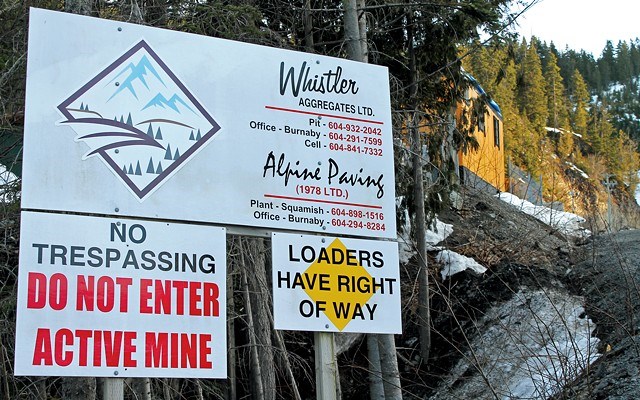A decade after it last sourced asphalt from Cheakamus Crossing's contentious asphalt plant, the Resort Municipality of Whistler (RMOW) may reconsider its current arrangement, which sees the product trucked in from Squamish.
Presenting to elected officials at Tuesday's Committee of the Whole meeting, municipal GM of infrastructure services James Hallisey said that several factors have changed since the RMOW adopted a policy requiring all asphalt be sourced a minimum distance of three kilometres from any Whistler neighbourhood.
"That decision was made in 2011 for some good reasons, but things have changed," he said. "One of the big things that has changed is the Whistler Asphalt Plant was upgraded in 2012."
For the past nine years, the RMOW has trucked in asphalt from a plant in Squamish run by Alpine Paving, which also runs the Cheakamus plant. The change came after numerous complaints from residents over air quality in the neighbourhood—although the municipality's monitoring has shown that particulate levels never exceeded provincial guidelines during that time, except on days when wildfire smoke blanketed the community.
In 2012, a new $2-million filtration system was installed at the Whistler plant; the same system is not in place in Squamish. The Whistler plant can also use up to 30 per cent recycled materials in its asphalt, unlike the Squamish facility.
"It's still a much more efficient plant than the one operating in Squamish that has ended up supplying Whistler with asphalt for most of the last nine years," Hallisey noted.
Although numerous residents Pique heard from said they regularly contend with dust and soot on days the plant operates, a 2016 assessment of air quality in Cheakamus found no statistical correlation between the level of particulates in the air and plant operations. The Whistler plant operated on 69 days in 2019. By comparison, the RMOW trucked in asphalt from Squamish on 19 days last year (it should also be noted that, if the RMOW were to source locally, it would likely be able to piggyback onto existing contracts at the plant, and wouldn't necessarily add additional operation days to the schedule).
Since 2011, trucking asphalt from Squamish has generated 270 tonnes of CO2, representing between two and five per cent of the municipality's annual corporate emissions, depending on the year, and cost an estimated $456,000 more than if it were sourced locally over that time, according to the RMOW.
"Given the climate crisis we're in, we need to take every step we can," said Councillor Arthur De Jong. "If the air quality is not an issue to our community, then it's kind of climate madness to be driving this all the way up the highway."
Hallisey said he couldn't recall any complaints from residents over the plant since at least 2016, although there have been a small number of complaints related to operations at the nearby quarry.
That doesn't mean Cheakamus residents don't have their concerns.
"The bottom line is that the neighborhood has changed and now has become [its] own little community where people live and it shouldn't have an asphalt plant next to it," wrote Gabi Moeller on Facebook, one of several resident comments critical of the plant.
"I love that they put down [an] expensive soccer field to let our kids play metres from an asphalt plant. Trucking from Squamish is not ... the solution either. But I don't want any more asphalt produced right next to where I live."
The local asphalt plant was a major point of contention for Nancy Wilhelm-Morden during her previous two terms as Whistler's mayor. In 2012, she shared residents' disappointment over a B.C. Supreme Court decision allowing the plant to continue operations in Cheakamus. At the time, Wilhelm-Morden said she believed homeowners had been told by municipal staff before moving into the former 2010 Olympic Athletes' Village that the plant would be relocated.
"The people who bought into the neighbourhood were under the impression that it would be moved," she told the Whistler Question in 2012.
Find the original story here.




